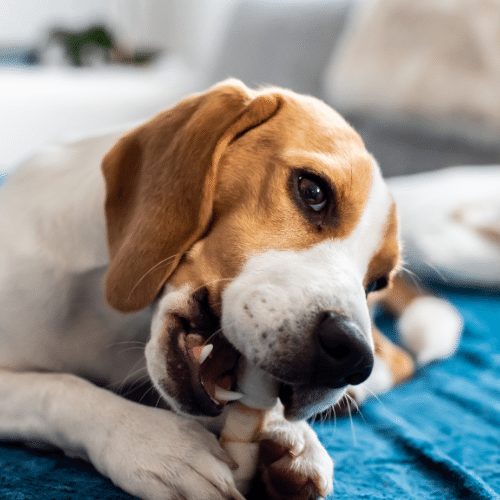Beagle puppies are known for their playful and mischievous nature, but their chewing habits can sometimes be a cause of frustration for their owners. Did you know that beagle puppies typically stop their excessive chewing behavior around the age of six to eight months? This is an important milestone for both the puppy and the owner, as it signifies the end of the teething phase and the transition into a more mature and well-behaved dog.
When it comes to understanding when beagle puppies stop chewing, it is essential to consider their developmental stages. During the first few months of a beagle puppy’s life, chewing is a natural instinct that helps them explore the world and alleviate teething discomfort. However, as they grow older, their adult teeth start to come in, replacing their puppy teeth. This process usually occurs between four to six months, resulting in a decrease in their chewing behavior. To minimize destructive chewing habits, it is crucial to provide appropriate chew toys, engage in regular exercise and mental stimulation, and establish consistent training routines to redirect their chewing behavior towards acceptable alternatives.
Beagle puppies typically stop chewing on everything around the age of 6 to 8 months. During this time, their puppy teeth are falling out, making way for their adult teeth. It’s important to provide them with appropriate chew toys to redirect their chewing behavior and help soothe their teething discomfort. Be patient and consistent with training, and gradually introduce them to different textures and tastes to encourage chewing on appropriate items. Remember, supervision is key to prevent destructive chewing.

When Do Beagle Puppies Stop Chewing? Understanding Their Chewing Behavior
Beagle puppies are known for their playful and mischievous nature. Like all puppies, they love to explore their environment with their mouths, which often leads to chewing on objects. Chewing is a natural behavior for puppies as it helps with teething and relieves boredom. However, it can become problematic if they’re chewing on inappropriate items or continue to chew on everything even when they’re older. In this article, we will discuss when beagle puppies typically stop chewing and provide some tips for managing their chewing behavior.
Understanding Why Beagle Puppies Chew
Before we delve into when beagle puppies stop chewing, it’s important to understand why they chew in the first place. Chewing provides several benefits to puppies:
- Relieves teething discomfort: Puppies experience discomfort when their adult teeth start to come in, and chewing helps alleviate the pain and pressure.
- Exploration and curiosity: Puppies use their mouths to explore their surroundings and learn about objects.
- Boredom and excess energy: Chewing can help keep puppies entertained and satisfy their natural need for mental and physical stimulation.
Now that we understand the reasons behind their chewing behavior, let’s move on to when beagle puppies typically stop chewing.
When Do Beagle Puppies Stop Chewing?
Beagle puppies often begin teething around 3 to 4 months of age, and their adult teeth should be fully grown in by the time they’re 6 to 7 months old. During this teething phase, they will have a strong urge to chew, and it’s essential to provide appropriate chew toys to redirect their chewing behavior. As they reach adulthood, their need to chew typically decreases.
Most beagle puppies will stop chewing on everything by the time they’re 1 to 1.5 years old. However, it’s important to note that each puppy is different, and some may take longer to outgrow their chewing habits. It’s crucial to be patient and consistent with training and providing appropriate chew toys.
Keep in mind that even after beagle puppies stop chewing on everything, occasional chewing may still occur. It’s essential to continue providing chew toys and monitoring their behavior to ensure they’re not chewing on harmful objects.
Tips for Managing Beagle Puppy Chewing Behavior
To help manage your beagle puppy’s chewing behavior, consider the following tips:
1. Provide appropriate chew toys
Make sure your beagle puppy has a variety of safe and durable chew toys to satisfy their chewing needs. Look for toys specifically designed for teething puppies, such as rubber toys or nylon bones.
2. Puppy-proof your home
Remove any tempting objects or items that could be harmful if chewed on. Keep electrical cords, shoes, and other small objects out of your puppy’s reach.
3. Supervise your puppy
Keep an eye on your puppy whenever they’re out of their crate or designated play area. If you catch them chewing on something they shouldn’t, redirect their attention to an appropriate chew toy.
4. Use positive reinforcement
When your puppy chooses to chew on their toys instead of inappropriate items, praise and reward them with treats. Positive reinforcement will help reinforce the desired behavior.
5. Provide mental and physical stimulation
Make sure your beagle puppy gets plenty of exercise and playtime to prevent boredom. A tired puppy is less likely to engage in destructive chewing.
Conclusion
Beagle puppies usually stop chewing on everything by the time they’re 1 to 1.5 years old. Understanding why puppies chew and providing appropriate chew toys can help redirect their chewing behavior. Remember to be patient, consistent, and provide plenty of mental and physical stimulation for your beagle puppy. With proper training and attention, they will eventually outgrow their chewing habits.
Comparison: Beagle Puppies vs. Other Breeds in Terms of Chewing Behavior
| Breed | Chewiness Scale (1-10) |
| Beagle | 8 |
| Labrador Retriever | 6 |
| Poodle | 4 |
| Bulldog | 3 |
Key Takeaways: When Do Beagle Puppies Stop Chewing?
- The teething stage usually starts around 3 to 4 months old.
- Beagle puppies may continue chewing until they are around 6 to 8 months old.
- Providing appropriate chew toys can help redirect their chewing behavior.
- Consistent training and positive reinforcement are essential in teaching them what is acceptable to chew.
- Some beagles may have a tendency to chew throughout their lives, but it can be managed through consistent training and providing appropriate outlets for chewing.
Frequently Asked Questions
Here are some common questions about when beagle puppies stop chewing.
1. At what age do beagle puppies stop chewing?
Beagle puppies tend to stop excessive chewing as they reach adulthood, which is typically around six to eight months of age. However, every puppy is different, and some may continue to chew beyond this age. It is essential to provide appropriate chew toys and engage in training to redirect their chewing behavior.
During the teething phase, which usually occurs between the ages of three to six months, beagle puppies may experience increased chewing. This is natural as their adult teeth start to come in and they seek relief from the discomfort. It is crucial to offer safe and durable chew toys during this time to help alleviate teething pain and prevent destructive chewing.
2. How can I discourage my beagle puppy from chewing on inappropriate items?
To discourage your beagle puppy from chewing on inappropriate items, it is important to provide them with plenty of appropriate chew toys. Ensure these toys are interesting and engaging, such as puzzle toys or toys that can be stuffed with treats. Additionally, you can use taste deterrents on items you do not want your puppy to chew on, as the bitter taste discourages them.
Consistent training and redirection are key. Whenever you catch your beagle puppy chewing on something they shouldn’t, firmly say “no” and redirect their attention to an appropriate chew toy. Positive reinforcement plays a crucial role in training, so praise and reward your puppy when they chew on their toys instead of inappropriate items.
3. Can beagle puppies stop chewing completely?
While it is not guaranteed that beagle puppies will stop chewing completely, most puppies tend to reduce their chewing behavior as they grow older and learn appropriate chewing habits. With consistent training and providing them with appropriate chew toys, you can help redirect their chewing instincts. However, it is always important to supervise your puppy and ensure they have access to safe chew toys to prevent destructive chewing.
It is also important to note that chewing is a natural behavior for dogs, and they may continue chewing on occasion, even into adulthood. Regular exercise, mental stimulation, and providing a variety of chew toys can help fulfill their chewing needs and reduce the likelihood of destructive chewing.
4. How can I choose the right chew toys for my beagle puppy?
When selecting chew toys for your beagle puppy, look for options that are safe, durable, and appropriately sized for their age and breed. Avoid toys that are easily torn apart or have small parts that can be swallowed. Opt for toys made of materials like rubber or nylon, as they are more resilient and less likely to cause harm if ingested.
Consider your beagle’s preferences as well. Some beagles may prefer softer toys, while others may enjoy toys they can chew and tug on. Provide a variety of textures and shapes to keep your puppy engaged. Regularly inspect the toys for any signs of damage and replace them as needed to ensure your puppy has safe and enjoyable chew toys.
5. Are there any natural remedies to help reduce a beagle puppy’s chewing?
While chew toys and training are the most effective ways to redirect a beagle puppy’s chewing, there are some natural remedies that may help reduce their chewing habits. One option is to offer them frozen treats or ice cubes to help soothe their gums during the teething phase. Additionally, providing them with appropriate bones or antler chews can satisfy their natural urge to chew.
It is important to note that not all natural remedies are safe for puppies, so consult with your veterinarian before trying any alternative solutions. They can provide guidance on safe and suitable options based on your puppy’s individual needs and health.

How to Train your Beagle Puppy to Stop Biting
Beagle puppies typically stop chewing around six to eight months of age.
During this time, it is important to provide them with appropriate chew toys and provide consistent training to help redirect their chewing behavior.
